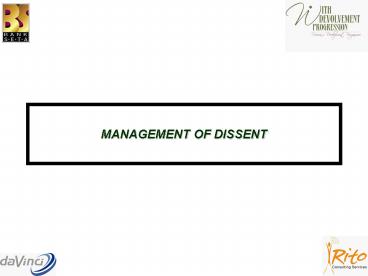MANAGEMENT OF DISSENT - PowerPoint PPT Presentation
1 / 18
Title:
MANAGEMENT OF DISSENT
Description:
Consensus with every idea by superiors without understanding facilitates wrong ... Perception of scoring brownie points' with employers aid in career growth. ... – PowerPoint PPT presentation
Number of Views:158
Avg rating:3.0/5.0
Title: MANAGEMENT OF DISSENT
1
MANAGEMENT OF DISSENT
2
- Dissent is defined as the sentiment of
non-agreement with the majority or the leader of
a group to which the dissenter is supposed to
belong to or obey to. Dissent is the opposite of
agreement, consensus or consent.
3
What do you see?
4
(No Transcript)
5
Dissent in organisationsShould it be encouraged
or suppressed?
- Consensus with every idea by superiors without
understanding facilitates wrong ideas/incorrect
decisions. - Continuous agreement means perspective is lost.
- Organisation is filled with individuals who
- Lack originality
- Filled with complacency, mediocrity and
communication restrictions. - No fire in the bellies of the team to innovate -
key ingredient for companies to progress. - Left with an environment that is dull and
monotonous.
6
WHY?????
- Consent can sometimes be promoted or forced upon.
- Employees have a personal perception of
management lack of communication. - Perception of scoring brownie points with
employers aid in career growth. - Lack of confidence about ideas generated as
being bad. - Some leaders rule autocratically their way or no
way. - Leaders not receptive to change constant
criticism. - Fear opposing opinion considered to be
rebellion. - Hierarchy, culture and structure of an
organisation. - Cases where the leader is a veteran no
questions asked leader is seldom/never
challenged
7
Side effects of constant consent
- World of work changed in the last decade and a
half. - Organisations no longer want YES MAN.
- Lack of debates and consent indicates something
wrong. - Teams that consent work like robots blindly
following a code. - Stop thinking spells disaster.
- Banking sector no differentiation in products
competitive advantage
8
- Constant consent when positively reinforced is a
two-edged sword. It would have people who would
be happy and continue to be a part of the
system. However, employees who are keen to learn
and challenge the limits are likely to feel
stifled and eventually move out.
9
Benefits of reasonable dissent
- Discussions/debates give rise to new ideas and
concepts. - Disapproval is the spark required to ignite the
flame of above average performance. - Inner most thoughts and opinions brought to fore
polished by team/leaders to plan effective
strategies. - Encourages healthy debates builds stronger
teams. - Explore beyond the obvious and unearth
opportunities for innovation. - NB. Disagreements to be healthy and always reach
consensus. - Creates an opportunity for team members to
present leadership skills. - Take the hot seat earn recognition.
- Leads to employee loyalty creates a 2nd line of
leadership succession. - Dissent to be based on solid foundations backed
by well studied facts and figures. - Intelligent black hat thinking, rather than
dissent for the sake of dissenting, creates
respect among teams.
10
How can leaders encourage participation?
- It has been proven that people dont leave
companies they leave managers. - Good leaders recognise teams potential drive
them to that limit. - Create a culture that not only encourages but
forces participation. - Platform for opinions to be voiced openly.
- Not only encourage initiative but reward it.
- Leaders to learn to take criticism in a
constructive way. - Adopt a flexible attitude an not an overbearing
one builds team spirit. - Avoid reprimand and retribution for those bold
enough to speak their heart. - Arrange outings to bring openness of ideas.
- LISTEN attentively.
- Express appreciation for genuine ideas and follow
through with implementation. - Never undermine/criticise any opinions ideas
are insignificant or bear no relevance
discourage others from voicing opinions/ giving
suggestions in the future.
11
Phenomenal people that chose to dissent in the
struggle for purposeful social changewent on to
become inspirational leaders..and who will leave
behind a legacy that will be long remembered.
12
Martin Luther King - Had a dream
13
Nelson Mandela
'I have fought against white domination and I
have fought against black domination. I have
cherished the ideal of a democratic and free
society in which all persons live together in
harmony and with equal opportunities. It is an
ideal which I hope to live for and to achieve.
But if needs be, it is an ideal for which I am
prepared to die.' Nelson Mandela 1964.
14
Mahatma Gandhi Satyagraha Non violent
struggle against injustice
15
China Now
- Population - 1.3 billion
- Socialist rule
- Minimal if not any dissent practised
16
China - Now
- .Content
17
Chinas Future
18
- Only time will tell!!!!!!!!!!!!!!!!!!!!































